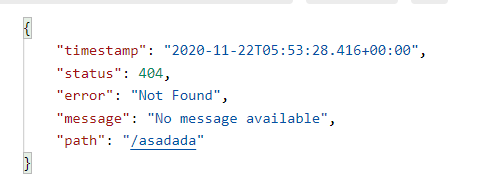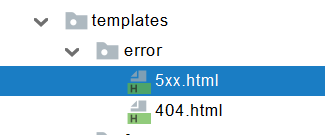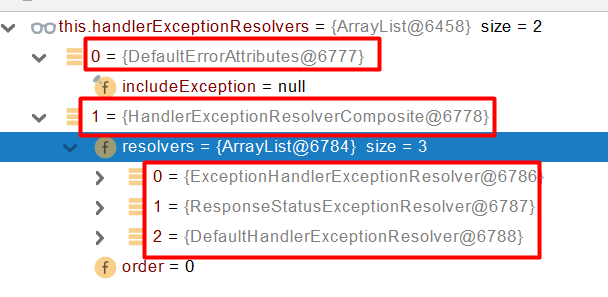SpringBoot-27 异常自动配置ErrorMvcAutoConfiguration
1、默认规则
- 默认情况下,Spring Boot提供
/error处理所有错误的映射 - 对于机器客户端,它将生成JSON响应,其中包含错误,HTTP状态和异常消息的详细信息。对于浏览器客户端,响应一个“ whitelabel”错误视图,以HTML格式呈现相同的数据
By default, Spring Boot provides an /error mapping that handles all errors in a sensible way, and it is registered as a “global” error page in the servlet container. For machine clients, it produces a JSON response with details of the error, the HTTP status, and the exception message. For browser clients, there is a “whitelabel” error view that renders the same data in HTML format (to customize 109 it, add a View that resolves to error).


- 要对其进行自定义,添加
View解析为error - 要完全替换默认行为,可以实现
ErrorController并注册该类型的Bean定义,或添加ErrorAttributes类型的组件以使用现有机制但替换其内容。 - error/下的4xx,5xx页面会被自动解析;
2、定制错误处理逻辑
- 自定义错误页
- error/404.html error/5xx.html;有精确的错误状态码页面就匹配精确,没有就找 4xx.html;如果都没有就触发白页
- @ControllerAdvice+@ExceptionHandler处理全局异常;底层是 ExceptionHandlerExceptionResolver 支持的
- @ResponseStatus+自定义异常 ;底层是 ResponseStatusExceptionResolver ,把responsestatus注解的信息底层调用 response.sendError(statusCode, resolvedReason);tomcat发送的/error
- Spring底层的异常,如 参数类型转换异常;DefaultHandlerExceptionResolver 处理框架底层的异常。
- response.sendError(HttpServletResponse.SC_BAD_REQUEST, ex.getMessage());
![image.png image.png]()
- 自定义实现 HandlerExceptionResolver 处理异常;可以作为默认的全局异常处理规则
- ErrorViewResolver 实现自定义处理异常;
- response.sendError 。error请求就会转给controller
- 你的异常没有任何人能处理。tomcat底层 response.sendError。error请求就会转给controller
- basicErrorController 要去的页面地址是 ErrorViewResolver ;
代码,注解@ControllerAdvice+@ExceptionHandler,这样可以被ExceptionHandlerExceptionResolver解析
/** * 处理全局web contoller异常 */ @Slf4j @ControllerAdvice public class GlobleExceptionHandler { @ExceptionHandler({ArithmeticException.class,NullPointerException.class}) public String handleArithmeticException(Exception e){ log.error("异常是:{}"+e); return "login";//返回视图地址 } }
代码:@ResponseStatus+自定义异常
@ResponseStatus(value = HttpStatus.FORBIDDEN,reason = "当前用户太多!") public class UserTooManyException extends RuntimeException { public UserTooManyException(){ } public UserTooManyException(String message){ super(message); } }
代码,自定义异常解析器,并设置优先级(PS:如果不设置优先级,可能被其他解析器提前处理)
@Order(value = Ordered.HIGHEST_PRECEDENCE)//设置最高优先级 @Component public class CustomerizeHandlerExceptionResolver implements HandlerExceptionResolver { @Override public ModelAndView resolveException(HttpServletRequest request, HttpServletResponse response, Object handler, Exception ex) { try { response.sendError(511,"自定义错误!"); } catch (IOException e) { e.printStackTrace(); } return new ModelAndView(); } }
3、异常处理自动配置原理
3.1 ErrorMvcAutoConfiguration 自动配置异常处理规则
3.1.1 配置属性:@EnableConfigurationProperties({ ServerProperties.class, WebMvcProperties.class })
- ServerProperties--->errorproperties--->private String path = "/error";
3.1.2 容器组件:类型:DefaultErrorAttributes -> id:errorAttributes
@Bean @ConditionalOnMissingBean(value = ErrorAttributes.class, search = SearchStrategy.CURRENT) public DefaultErrorAttributes errorAttributes() { return new DefaultErrorAttributes(); }
- public class DefaultErrorAttributes implements ErrorAttributes, HandlerExceptionResolver, Ordered
- DefaultErrorAttributes:定义错误页面中可以包含哪些数据
-
public Map<String, Object> getErrorAttributes(WebRequest webRequest, ErrorAttributeOptions options) { Map<String, Object> errorAttributes = getErrorAttributes(webRequest, options.isIncluded(Include.STACK_TRACE)); if (Boolean.TRUE.equals(this.includeException)) { options = options.including(Include.EXCEPTION); } if (!options.isIncluded(Include.EXCEPTION)) { errorAttributes.remove("exception"); } if (!options.isIncluded(Include.STACK_TRACE)) { errorAttributes.remove("trace"); } if (!options.isIncluded(Include.MESSAGE) && errorAttributes.get("message") != null) { errorAttributes.put("message", ""); } if (!options.isIncluded(Include.BINDING_ERRORS)) { errorAttributes.remove("errors"); } return errorAttributes; }
-
@Override @Deprecated public Map<String, Object> getErrorAttributes(WebRequest webRequest, boolean includeStackTrace) { Map<String, Object> errorAttributes = new LinkedHashMap<>(); errorAttributes.put("timestamp", new Date()); addStatus(errorAttributes, webRequest); addErrorDetails(errorAttributes, webRequest, includeStackTrace); addPath(errorAttributes, webRequest); return errorAttributes; } private void addStatus(Map<String, Object> errorAttributes, RequestAttributes requestAttributes) { Integer status = getAttribute(requestAttributes, RequestDispatcher.ERROR_STATUS_CODE); if (status == null) { errorAttributes.put("status", 999); errorAttributes.put("error", "None"); return; } errorAttributes.put("status", status); try { errorAttributes.put("error", HttpStatus.valueOf(status).getReasonPhrase()); } catch (Exception ex) { // Unable to obtain a reason errorAttributes.put("error", "Http Status " + status); } }
3.1.3容器中的组件:类型:BasicErrorController --> id:basicErrorController(json+白页 适配响应)
@RequestMapping("${server.error.path:${error.path:/error}}") public class BasicErrorController extends AbstractErrorController{}
- 是一个Controller
- 类上注解:@RequestMapping("${server.error.path:${error.path:/error}}")
- 处理默认 /error 路径的请求;
- 页面响应 new ModelAndView("error", model);
- 容器中有组件 View->id是error;(响应默认错误页)
- 容器中放组件 BeanNameViewResolver(视图解析器);按照返回的视图名作为组件的id去容器中找View对象。
3.1.4 容器中的组件:类型:DefaultErrorViewResolver -> id:conventionErrorViewResolver
- 如果发生错误,会以HTTP的状态码 作为视图页地址(viewName),找到真正的页面
- error/404、5xx.html
如果想要返回页面;就会找error视图【StaticView】。(默认是一个白页)

4、异常处理步骤流程
1、执行目标方法,目标方法运行期间有任何异常都会被catch、而且标志当前请求结束(requstCompletion?此处记不清);并且用 dispatchException
2、进入视图解析流程(页面渲染?)
processDispatchResult(processedRequest, response, mappedHandler, mv, dispatchException);
3、mv = processHandlerException;处理handler发生的异常,处理完成返回ModelAndView;
- 1、遍历所有的 handlerExceptionResolvers,看谁能处理当前异常【HandlerExceptionResolver处理器异常解析器】
![image.png image.png]()
- 2、系统默认的 异常解析器;
![image.png image.png]()
- 1、DefaultErrorAttributes先来处理异常。把异常信息保存到rrequest域,并且返回null;
- 2、默认没有任何人能处理异常,所以异常会被抛出
- 1、如果没有任何人能处理最终底层就会发送 /error 请求。会被底层的BasicErrorController处理
- 2、解析错误视图;遍历所有的 ErrorViewResolver 看谁能解析。
![image.png image.png]()
- 3、默认的 DefaultErrorViewResolver ,作用是把响应状态码作为错误页的地址,error/500.html
- 4、模板引擎最终响应这个页面 error/500.html









 浙公网安备 33010602011771号
浙公网安备 33010602011771号